Fantasia 2018, Day 3, Part 1: Maquia: When the Promised Flower Blooms and Unity of Heroes
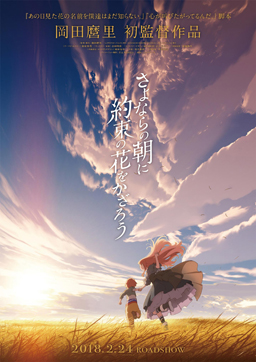 Weekend days are busy days at the Fantasia film festival. Weekends are when most people are most often free to see movies, so the programmers obligingly schedule a lot of films for Saturdays and Sundays. Last Saturday I had three movies I wanted to see. On the Sunday, I had five. Which meant that Fantasia was well and truly underway.
Weekend days are busy days at the Fantasia film festival. Weekends are when most people are most often free to see movies, so the programmers obligingly schedule a lot of films for Saturdays and Sundays. Last Saturday I had three movies I wanted to see. On the Sunday, I had five. Which meant that Fantasia was well and truly underway.
The first film on the Saturday was an anime from Japan called Maquia: When the Promised Flower Blooms (Sayonara no Asa ni Yakusoku no Hana o Kazaro, which according to Wikipedia translates directly as “Let’s Decorate the Promised Flowers in the Morning of Farewells”). Written by veteran anime screenwriter Mari Okada, it’s also her first feature as a director. Opening this weekend in a limited release across North America, and next weekend in the UK, it’s an elaborate secondary-world fantasy story that mixes the epic and the domestic startlingly well. Not only is it an early contender for my favourite film of this year’s festival, it’s immediately become one of the best high fantasy films I’ve ever seen.
In an idyllic forest live the Iorph, an immortal people who weave long cloths called the hibiol, which are symbols of their lives and destinies: “the work of a loom is like the flow of time,” we’re told early on, and this is a movie that is deeply concerned with time. For while the Iorph’s society is timeless, their world’s shattered by the invasion of a human army from the kingdom of Mezarte. The Mezartians ride dragonlike creatures called Renatos, and easily destroy the Iorph. Only one youthful Iorph escapes, Maquia (voiced by Manaka Iwami). In doing so she stumbles across a human infant, whose parents have been killed by bandits. She decides to save the child.
There are a lot of ways for the story to go at this point. Most of the standard ways would involve Maquia trying to overthrow the Mezarte, or maybe the baby growing up to fight them. Absolutely nothing like that happens. Instead the film follows Maquia as she wanders deeper into Mezarte, away from the ruin of her homeland, and tries to learn how to raise the child she’s now acquired. The concern of the movie is with how she lives over time, over the years as she raises her son, who she names Ariel (also Erial, according to the IMDB, in either case voiced by veteran voice actor Miyu Irino, who among other films had a role in Miss Hokusai and was the male lead in Spirited Away). The politics of Mezarte are important, but only insofar as they shape Maquia’s everyday life. We have to understand them to understand what’s happening to Mezarte society, and have to understand Mezarte society to understand what options there are for Maquia and Ariel and the other people they come to live with.
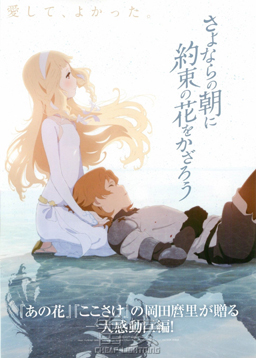 There are large-scale epic overtones in the film that explode at the climax. There is a kind of resistance against the Mezarte, there are other Iorph survivors, there are neighbouring nations of the Mezarte who have plans of their own. There are reasons why the Mezarte attacked the Iorph. All of these things are present, all of them shape the film, all of them interact to shape the world of the story as time passes. And time does pass: the main story covers two decades or more of time, becoming almost a generational story with the relationship of Maquia and Ariel at its core. This scope allows for an exploration of the depth of their characters and their relationship.
There are large-scale epic overtones in the film that explode at the climax. There is a kind of resistance against the Mezarte, there are other Iorph survivors, there are neighbouring nations of the Mezarte who have plans of their own. There are reasons why the Mezarte attacked the Iorph. All of these things are present, all of them shape the film, all of them interact to shape the world of the story as time passes. And time does pass: the main story covers two decades or more of time, becoming almost a generational story with the relationship of Maquia and Ariel at its core. This scope allows for an exploration of the depth of their characters and their relationship.
The movie is a domestic fantasy of a kind that seems relatively rare in secondary fantasy, a story of family and of the relationship of mothers and children. It’s also a story about the complexity of the world, of how the large-scale and small-scale are interrelated, how the everyday and the grand are linked. It’s perhaps the nearest thing I’ve ever seen to a fantasy version of War and Peace, following a family caught up in turbulent world-shaking times; but among the differences, there’s a concern here with lower-class life, the life of the everyday worker or low-grade soldier.
It’s a movie that’s conscious of its symbols and follows in the great fantasy tradition of literalising metaphors: immortals who weave time on a loom are a potent archetype, and it’s fascinating here to see how the film consciously follows their devastation with the advent of a small-scale industrial revolution. Mezarte, worried because their magnificent dragons are falling ill, turns to ironwork as a replacement form of power. Cloth gives way to metal. Timelessness gives way to the gears of history grinding away.
The designs of the film are spectacular — this is a movie that’s always a joy to look at, filled with striking designs and powerful colour work as well as impressively-composed images. But in particular the designs of Mezarte help to tell the story as they change over time. The vague feel of the European Renaissance isn’t too unlike other anime I’ve seen — there’s a similar general vocabulary — but there’s a specificity to the presentation here that’s simply unique; and the way different things are shown in different ways at different times helps bring out not only the change in Mezarte over time but also the shape of the movie’s story. There’s a narrative elegance in the shift from a village filled with wood construction and natural curves in window-frames or staircases to a city filled with high stonework and with a skyline dominated by a vast iron wheel. We have moved from one part of the tale to another as we move forward a few years. We have moved from one community to another.
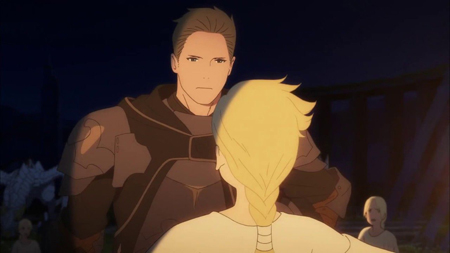 Watching this movie I couldn’t help but think of John Clute’s schema of fantasy stories: a wrongness, followed by a thinning of magic, leading (hopefully) to a healing. That structure fits this story almost perfectly. Crucially, though, I don’t think it gives anything away to say that the original state of things is not restored. That is clearly the point, from early on in the movie. Time must flow, and if a character near the end wonders “why must time keep flowing?” there is no answer. It’s simply the condition of life. What the movie I think suggests is that new balances may always be found.
Watching this movie I couldn’t help but think of John Clute’s schema of fantasy stories: a wrongness, followed by a thinning of magic, leading (hopefully) to a healing. That structure fits this story almost perfectly. Crucially, though, I don’t think it gives anything away to say that the original state of things is not restored. That is clearly the point, from early on in the movie. Time must flow, and if a character near the end wonders “why must time keep flowing?” there is no answer. It’s simply the condition of life. What the movie I think suggests is that new balances may always be found.
And the meanwhile there is meaning to be found in the evanescent moments of life. In this film time passes not only in dramatic incidents but in montages covering years. There’s a good balance here between hard cuts from year to year and sequences of meditative images evoking daily life. I think the movie can do that because Okada’s sensitive to moments as moments, not as plot points or set-ups for bigger moments — they may be those things, but moments of time are moments of time in and of themselves, with their own meanings and emotional charges. Out of many moments comes growth and life. Maquia is a lovely and profoundly fantastic story about everyday life, about love and time and family. It’s a great fantasy story, and a great film.
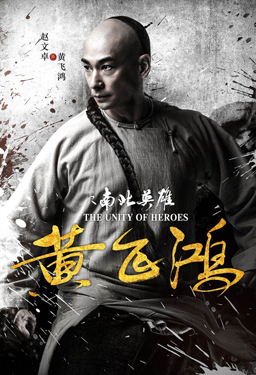 Maquia played at Fantasia’s large 650-plus-seat Hall Amphitheatre (officially the Alumni Auditorium), and so did the next movie: Unity of Heroes. It was a live-action kung fu film, and if it’s technically a sequel to a well-known series of films from a couple decades past, it requires no knowledge of the prior movies.
Maquia played at Fantasia’s large 650-plus-seat Hall Amphitheatre (officially the Alumni Auditorium), and so did the next movie: Unity of Heroes. It was a live-action kung fu film, and if it’s technically a sequel to a well-known series of films from a couple decades past, it requires no knowledge of the prior movies.
Wong Fei-hung was a doctor and martial artist in Guangdong in the late 19th and early 20th centuries who has become a folk hero. Over 100 films and TV shows chronicle his exploits, real and imagined. Wong’s character has been imagined in different ways, from Jackie Chan’s cocky knockabout Wong in 1978’s Drunken Master (Zui quan) to Eddie Peng’s brooding, angry Wong in 2014’s Rise of the Legend (Huang feihong zhi yingxiong you meng). Possibly the best-known film interpretation is in the Once Upon A Time In China series. Jet Li played Wong in the first three of those films, was replaced by Vincent Zhou for the fourth and fifth, then returned for the sixth. Zhou also played the character in a TV series directed by Tsui Hark, who directed the first, second, third, and fifth film.
Now comes Unity, starring Zhou as Wong Fei-hung in a film directed by Lin Zenzhao from a screenplay by Niu Xinyao, Gao Yuhao, Yang Ning, and Li Zhenyi. It was made for iQiyi, a Chinese video streaming service a little like Netflix (Netflix actually has a licensing deal with iQiyi to show some of its productions). I understand it’s a sequel to the Once Upon A Time version of Wong Fei-hung; I saw at least one of those movies, but two decades ago, and have retained little. I found the movie required no knowledge of the earlier films, though some of the characters were introduced slightly abruptly, and apparently there are a number of familiar touches for people who know the Once Upon A Time films.
With all that background noted, Unity of Heroes itself is surprisingly ordinary. It’s not bad. But it’s also not particularly outstanding. In almost every way, it’s solid enough that nothing stands out as defective, and also average enough that nothing stands out as exceptional.
The story here concerns a new drug that’s appeared in Guangdong at the same time as representatives of the British East India Company open a new hospital caring for the poor. What’s happening is that the foreigners have developed a new drug, like opium but much purer and more addictive, that has the side-effect of turning people who take it into superstrong zombies. The drug causes long-term damage and even death to those who take it, so Wong Fei-hung, aided by his students and aunt (Wei Ni), must track down the source and put a stop to it — at the same time as a rival martial-arts school opens in Guangdong.
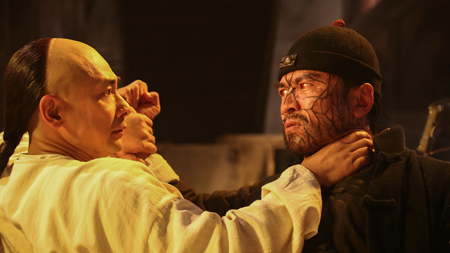 Visually, it’s pleasant enough without being spectacular. There are some nice camera moves, here and there, and a general unobtrusive sense of motion. It’s a period film, and that comes across without costumes, props, or sets looking especially detailed. There is a very nice set in the villains’ lair, competently introduced early on so it can return as the setting for the climactic final fight. Mostly things are easy on the eyes, the story competently told, and nothing especially memorable.
Visually, it’s pleasant enough without being spectacular. There are some nice camera moves, here and there, and a general unobtrusive sense of motion. It’s a period film, and that comes across without costumes, props, or sets looking especially detailed. There is a very nice set in the villains’ lair, competently introduced early on so it can return as the setting for the climactic final fight. Mostly things are easy on the eyes, the story competently told, and nothing especially memorable.
The fights are solid but not spectacular. There’s some wirework, some CG, a few clever ideas to show the impact of a punch. The final battle’s effective in story terms, feeling like the appropriate end to the story the film’s been telling, but the stunts felt slightly perfunctory.
The movie does have a strong comedic aspect, which is welcome. It’s mostly executed well, though there aren’t really any massive belly laughs. The timing’s solid, and one bit of physical comedy becomes set-up for a moment at the climax. Generally the comedy’s more knockabout with Wong’s comic-relief students, and more character-oriented when it involves Wong’s relationship with his aunt.
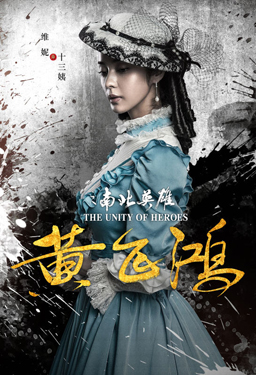 The construction of the plot’s quietly solid. It builds well. Fights are set up, emerging at key points in the story. The rival martial-arts club makes for a good sub-plot to contrast with the main story of the evil Westerners. There’s no unexpected twist, but it holds together well.
The construction of the plot’s quietly solid. It builds well. Fights are set up, emerging at key points in the story. The rival martial-arts club makes for a good sub-plot to contrast with the main story of the evil Westerners. There’s no unexpected twist, but it holds together well.
I will say that the idea of a unity of heroes is less prominent than the title suggests. That’s at least in part because the obvious other hero who will unite with Wong, rival kung fu teacher Master Wu (Michael Tong) gets too little screen time and doesn’t really do anything especially heroic. Theme, then, is probably the least effective aspect of the film. There is subtext — the movie’s villains are Westerners, but Wong’s aunt is fascinated by Western technology. It is in fact by fusing Western medicine and Chinese medicine that Wong figures out how to save a man’s life. There is, then, another meaning to the idea of unity, though not necessarily a unity of heroes.
Ultimately, this is a pleasant movie that does nothing wrong but also isn’t especially rewarding. It passes the time, but it’s not worth going out of the way to see. I can’t say I’m sorry I saw it, but I’m also not thrilled by it. The way I think of it is this: Glen Sather, the former General Manager of the Edmonton Oilers hockey team, once said that what he looked for in young prospects was the one thing they did outstandingly well. What one characteristic did they have that was their bread-and-butter? His point was that skill would be what determined if they got to the NHL level as a player. Unity of Heroes is lacking any single great quality. It doesn’t do anything wrong. But it never gets around to doing anything right. And it feels, in the end, like a minor-league film. Glen Sather would be disappointed.
Find the rest of my coverage of Fantasia 2018 here!
Matthew David Surridge is the author of “The Word of Azrael,” from Black Gate 14. You can buy his first collection of essays, looking at some fantasy novels of the twenty-first century, here. His second collection, looking at some fantasy from the twentieth century, is here. You can find him on Facebook, or follow his Twitter account, Fell_Gard.
There is exactly ONE showing of Maquia in the bazillion or so theaters near where I live. I grabbed tickets online so I could see it on Saturday. The trailer is intriguing, and your review makes it sound worthwhile. I am not much of a movie person, but I suppose I could put my Black Company books and back issues of KODT down long enough to take my wife out for an afternoon 🙂
Really hope you guys enjoy it! I’d love to hear what you think!
What an amazing film. It is hard to come up with the right words. Your review is excellent and does a much better job of expressing the themes and sub-themes than I could ever do. Anyone who has ever contemplated time, life, death, and especially love, will be moved by Maquia.
Some of the film is uncomfortable to watch as Maquia, Arial, and the other characters struggle with the nature of love. The boys at the mill react as you would expect them to when they see his “mother.” No attempt is made to make this easy to watch. The film is not terribly graphic, but enough is implied in the battles and the birthing scenes to make them believable.
The final scene when she calls out to Ariel while the dandelion seeds fly away is seriously powerful stuff. It was the last in a series of images, both visual and verbal, that will choke up anyone who can be moved.
Only 9 people came to our showing. Had the theater given it more showings at better times, I would like to believe there would have been dozens of puffy eyes at the end of each showing. Alas, I won’t launch into my usual commentaries on popular culture and quality.
Matthew, thank you so much for recommending this film. I will make sure everyone in my small social circle sees it.